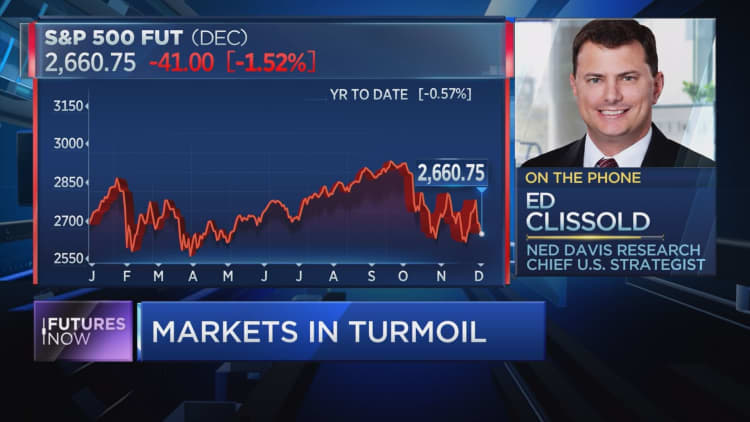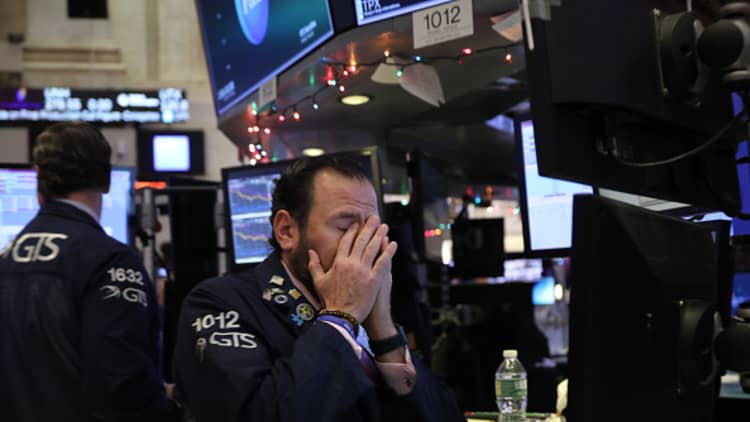Beyond his legal problems, Donald Trump suddenly faces rising odds of becoming the first president to seek re-election during economic recession since Jimmy Carter.
Until now, Robert Mueller's special counsel investigation has loomed as a singular threat to further erode the president's standing. That reflects both the gravity of a probe that has produced guilty pleas from multiple Trump associates, and the robustness of growth during the first two years of his term.
But the uncertainty on display in gyrating financial markets this week has darkened expectations for Trump's last two years. In the fourth quarter of 2018, forecasters already see growth slowing from the 4.2 percent and 3.5 percent recorded in the second and third quarters, respectively. Job growth fell short of expectations in November, according to data released Friday morning.

For 2019 and beyond, they expect growth to slow progressively further as fiscal stimulus from lower taxes and higher spending winds down. Many predict the economy will lapse into recession in 2020.
"A strong dollar, weaker growth abroad, mounting corporate debt, a slowdown in housing and the ongoing havoc that tariffs are wreaking on global supply chains are each taking a toll," Diane Swonk, chief economist for Grant Thornton LLP, wrote this week. "No one knows for sure which straw will break the camel's back, only that they are piling up."
Swonk has accelerated her previous prediction of recession from the second half of 2020 to the first half. In October, the National Association for Business Economics reported that two-thirds of forecasters it surveyed expect recession by the end of Trump's re-election year.
That would represent a historically rare event – and an ominous one for the president's chances of a second term.
Typically, the intertwined rhythms of politics and economics have ensured growth when incumbent presidents face the voters. And while economic expansions have not guaranteed November victory, contractions usually presage defeat.
Dwight Eisenhower, Richard Nixon, Ronald Reagan and George W. Bush all saw recessions begin in the first year of their tenures, but end by the close of their second year. Each won re-election.
For Bush and Eisenhower, recession returned in the last year of their second terms – when they were no longer eligible to run again. In both cases, their party's nominees lost the White House.
The last president burdened with recession as he sought a second term was Carter, in 1980. The results weren't pretty.
As the year began, Carter boasted a 54 percent Gallup job approval rating. But the recession that began in January, combined with the Iranian hostage crisis, dragged it below 40 percent for good within five months.
After surviving a vexing Democratic primary challenge from Sen. Edward Kennedy, Carter lost 44 of 50 states to Reagan in November. For years afterward, Republicans invoked Carter as an emblem of economic weakness.
Democrats spent decades doing the same with the most recent president before Carter to campaign in a downturn. That was Herbert Hoover, whose entire term was swallowed by the Great Depression.
The exception to the pattern was Calvin Coolidge, who overcame recession to win re-election in 1924. George H.W. Bush, who died last week, lost to Bill Clinton despite overseeing four consecutive quarters of 4 percent-plus growth in 1992.

Trump may yet avoid recession. Through trade policy, he controls one key lever for influencing the economic outlook. The chaos over tariffs that has heightened business uncertainty represents a self-inflicted wound.
Moreover, growing bearishness is hardly uniform. In a new NABE survey this week, three-fourths of forecasters said uncertainty tilts toward downside risks, but the group projects 2.7 percent growth in 2019.
"Cautious optimism," says survey chair Gregory Daco of Oxford Economics. He puts the odds of recession by 2020 at just 35 percent. Harvard economist Greg Mankiw, a top White House advisor to George W. Bush, pegs them even lower at 25 percent.
Yet Trump's weak public standing leaves him no political cushion if the economy turns down. As he braces for Mueller's findings and the new Democratic-controlled House, his most recent Gallup approval rating was just 40 percent.
Little wonder that Trump economic advisor Larry Kudlow this week declined to entertain what he called "speculations" about looming recession. "We're humming," Kudlow said.


